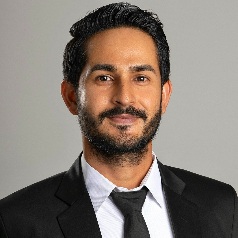For the first 15 years of my life, I lived in a bamboo hut in a refugee camp in Nepal. We didn’t have electricity, running water, or access to basic healthcare. I watched people I loved suffer and die from illnesses that are preventable or treatable in most parts of the world.

Narayan Dhimal
One of the clearest memories I have is from when I was around 6 or 7 years old. I was sitting on the floor waiting for a cup of tea when my mother, who had been smiling and serving our family, suddenly collapsed. She had a grand mal seizure. I remember her biting her tongue and shaking violently on the floor while my father tried to support her head. My sister and I cried, frozen with fear. It was only years later that I fully understood what had happened.
My aunt died of cholera in the camp, a disease that is easy to treat with oral rehydration therapy in better-resourced settings. My grandmother suffered for years from what we later learned was a liver disease, but she died shortly after being diagnosed in the US—too late for treatment.
These personal experiences sparked my desire to pursue a career in science and medicine. As a child, all I could do was apply homemade ointments and use torn cloths as bandages. I promised myself that one day, I would become someone capable of doing more.
When we were finally resettled in the United States through a program coordinated by the UN and the International Organization for Migration (IOM), our lives changed drastically—but not without new challenges. My parents struggled to find jobs, learn the language, and understand a new culture. My father worked at a gas station and later at a cemetery, and my mother began cleaning hotel rooms, a job she still holds. Despite these challenges, I remained committed to education. I graduated high school and pursued biomedical sciences at the University at Buffalo.
Finances were always tight. I never had a college fund or savings to fall back on. I worked part-time jobs during undergrad and used every resource available—textbook rental programs, tutoring positions, and scholarships. I also lived frugally: bus rides instead of a car, meal prepping in bulk, and using lab coats and equipment. I developed a habit of tracking every dollar I spent using a spreadsheet, which became one of the most empowering tools I’ve ever used.
I later pursued a PhD in neuroscience, where I studied Krabbe disease, a fatal demyelinating disorder. I immersed myself in the lab, learning advanced techniques, publishing papers, and writing grants. I was awarded the NIH F31 fellowship to support my doctoral research. It was a huge relief financially, but I still lived modestly—paying for conferences out-of-pocket, cooking all my meals, and reusing supplies. I often mentored students and took on freelance editing jobs for additional income.
Applying to medical school while in a PhD program was one of the hardest things I’ve done. I was initially rejected due to an average MCAT score and limited clinical experience. I took the feedback seriously. I paused my lab work to focus on MCAT prep, shadowed more physicians, and built a stronger application. When I got my acceptance—two days before Christmas—I cried. It felt like the beginning of a dream I had carried since childhood.
Now in my first year of medical school, I continue to live with the same discipline and resourcefulness. I still update my budgeting every couple of weeks. I continue applying for scholarships every semester and tutor students when time permits. I’ve learned to maximize every opportunity while being mindful of my energy and mental health. The truth is, medical school is demanding. Balancing finances on top of that requires not just planning but purpose.
Over the years, I’ve developed a few personal financial rules:
It’s not always easy. Sometimes it feels isolating to skip social outings or resist buying things others see as basic. But I constantly remind myself of my “why.” I remember my mother collapsing on that floor. I remember the countless patients in the camp who died waiting for care. I remember my community back home, still struggling. Every dollar saved now is a step closer to going back and making a difference there.
My journey has taught me that being poor doesn’t mean being powerless. I’ve built a life around intention—academically, professionally, and financially. I believe financial literacy should be taught in every stage of training, especially in medicine. Many of us come from underrepresented backgrounds and carry not just our own dreams but the hopes of our families. Learning how to manage money, seek out opportunities, and live with discipline can make the difference between surviving and thriving.
Beyond becoming a doctor, I hope to advocate for preventive care and health education in underserved communities. I want to open doors for future students from backgrounds like mine. I want to help others build not only a career in medicine but a life that feels stable and purposeful. Whether it’s through community clinics, educational outreach, or mentorship, I want to be the person I once needed growing up.
We often talk about the financial cost of becoming a physician, but we rarely talk about the cost of not having people like me in medicine. Communities lose out when those of us with lived experience can’t afford to make it. That’s why I share my story—not just for recognition, but to remind others that they’re not alone. You can rise with very little if you move with intention, stay grounded in your purpose, and never stop believing in what’s possible.
Medicine is my calling, but budgeting is how I got here. And I plan to carry both with me—one to heal, and one to survive.